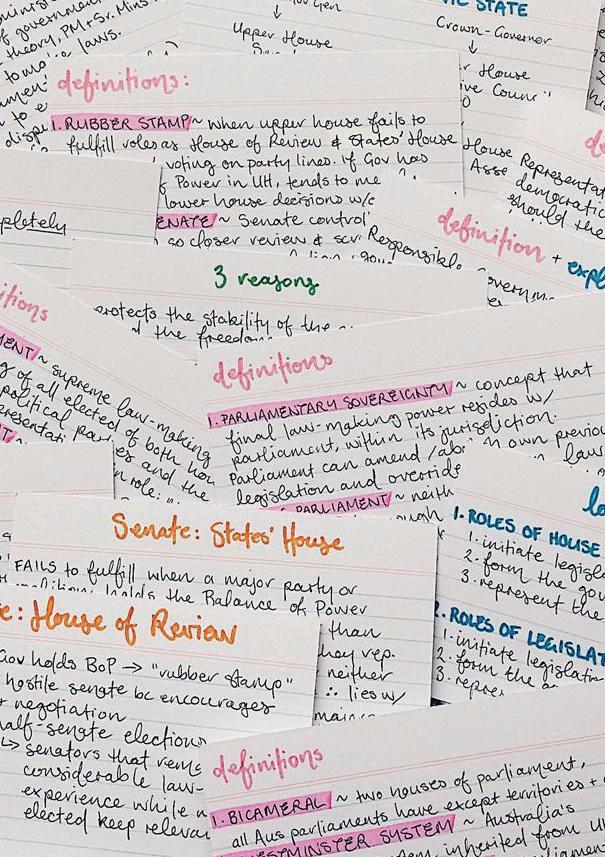REVISION
Strategies to make your knowledge stick!

Strategies to make your knowledge stick!
For a lot of students, exams come hand in hand with stress and a feeling of ‘where do I start?’ That’s where this booklet comes in!
We hope that the strategies outlined over the next few pages will help you to find the revision techniques that work for you, so that you can find ways to get the knowledge to sink in and to retrieve it when you’re in your exam. Not all techniques will be suited to you, but try them out and you’ll definitely find something that works for you!
Success in your exams and meeting your potential doesn’t happen by accident. To be successful, you need to put in hard work, but we’re not talking about copying out of a textbook or continually re-reading notes you made months ago. You need to DO!

There is no subject that you can’t revise for...

It’s important to find a workspace that you feel comfortable in, so before you start, try the following tips to make your study area more zen!
• Tidy your room – make it a space that you want to spend time in. If you can, try and work with plenty of natural light and a comfortable seat
• Have a timetable for your revision – this is your battle plan! It will help you to cover all the critical areas and focus your mind on the task at hand
• Make sure that you have breaks - go outdoors, do some exercise, spend some time with your pets, chat to a friend or make a drink or snack. Research shows that we learn more by revising in small chunks so taking breaks will avoid burnout
• Get all your equipment ready before you sit down so that you are prepared and in the right frame of mind
• Remove distractions! Work at a desk not in your bed – this way you’re not tempted to snooze! Keep your phone away from you so that you’re not tempted to message friends or browse social media
• Ask someone at home to check on what you’ve done and test you on what you’ve learnt –having someone encouraging you and testing yourself helps the knowledge to sink in
• Look after your wellbeing. Eat healthily, drink plenty of water, take regular exercise and ensure you get enough sleep, so you are as ready as you can be when taking your exams
Everyone has different learning styles. Some people prefer to use visual aids to remember information, whilst others learn best by ‘doing’. The following strategies are designed to help you find the right learning style for you.

These help you to divide a topic into 12 subtopics to make revision more manageable.
• Create your clock using an A3 piece of paper and the template overleaf
• You can colour code for different things such as vocabulary, quotes or dates etc.
• Revise each of the 12 sections for 5 minutes each
• Revisit this revision tool regularly so that the information begins to stick in your brain and can be recalled quicker every time!
Creating flash cards can help with picking out key information and gives you a way of testing yourself.
Tips for making your flash cards:

• Keep it simple – avoid packing a flash card full of information
• Phrase your flash cards as questions so for example, instead of writing ‘stages of mitosis’ you could write ‘what are the stages of mitosis?’ to quiz yourself
• Use the exam specification to help you or ask your teacher for a list of skills that you need to know for a certain question or paper. For example, on one side of your flash card you could write ‘what is the formula for magnification?’ and on the other side you could write the formula
• Add colour and keep them neat – this makes it visually more appealing and easier for your brain to remember
• Use different coloured cards for different subjects
• Have drawings on the cards to stimulate your memory and connect to ideas!
• Take your time to make them meaningful – have you got a flash card for the information that you need
• Get someone to test you on them or put them in a pile, pick the top one up and start your revision!
• As you work through the testing, put them into three piles: ‘I really get this’ ‘I need to revise this again’ ‘I really need a teacher’s help with this’
• You want to revisit your flash cards little but often
Mind maps are great memory tools. Drawing colourful learning maps will help you to memorise facts and figures. The benefit of mind maps are:

• They help you to organise information into easy to remember chunks
• The organisation process helps you to understand and remember content
• They help reduce information overload
• We generally find it easier to remember images and diagrams instead of paragraphs of writing
• Mind maps are also full of mental triggers which help our memory recall
• The mind map structure is similar to how our own brain stores and recalls information
1. Put your main idea or topic in the middle of the page and draw a circle around it. This will be your starting point
2. Add related keywords or phrases all around this, then use lines to connect these ‘first level branches’ to the starting point
3. As needed, connect further keywords and phrases to the first level branches (these are called child branches)
4. If needed, add further branches to your child branches
Tips:
• Use keywords and short phrases, not full sentences
• Use images, icons and colour as you see fit. These are helpful memory triggers
• Try to create a sense of hierarchy as you break down the information
• Keep the mind map to one side of paper – A3 or A4 is usually a good size
Cornell notes divide your page and your note-taking into four distinct sections: title, cues, notes, and summary.


Here’s what each section should contain:
• Title: the top of the page should contain the course and/or topic title, plus the date of your notes
• Cues: the left-hand margin column is for keywords, phrases, subtopics and questions. These “cues” help you to organise your notes and pinpoint where relevant notes and answers can be found
• Notes: the large right-hand column is where your notes go. Keep them lined up with your cues, and start a new line for each new note or point
• Summary: this section forms a footer at the bottom of the page and should contain a brief summary of the main concepts covered on each page
The summary section is the most important part of the Cornell method – that’s where the information really finds its way into your memory.
These can be a great way of testing each other and being accountable for your revision. Google Meet is a really useful tool for this if you are unable to meet in person.
How to create one:
• Ask yourself who would be willing to commit to a schedule – you need reliable study friends

• Choose people who are broadly aiming for the same grades as you and are available around the times that you are free
• Agree on the topics for revision or testing before you meet
These might be why you’re struggling:
• Reading notes over and over - probably the worst waste of revision time! Almost no information is stored this way as you’re not taking in what you’re reading
• Writing notes over and overthis isn’t an effective revision strategy as it doesn’t force your memory to retain the knowledge. You can even do this without thinking about what you’re writing

• Highlighting and underlininglooks pretty but has whatever you’ve highlighted entered into your memory?
• Not checking for understanding - don’t just read it, ask yourself if you actually understand it or you won’t be able to apply that knowledge to an exam question
• Last minute revision
• Revising until exhaustion
• No revision timetable
• Poor study environment
• Procrastination
You’ve worked so hard to gain and retain the knowledge through all your revision and now you need to apply to the exam questions.
Doing this successfully requires that you understand your exam technique.
Exam technique tips:
• Think like an examiner – read the specification and the examiner’s report to get the hints

• Command words in a question - make sure you understand and read them carefully
• Have acronyms to help you answer certain questions and write these down as soon as you’re allowed to write on your paper
• Practice time management – make sure you know how long you need to spend on each question
• Never stop writing – you are given the length of your exam for a reason. The moment you stop writing, you stop gaining marks
• Read through your answers to check for silly errors or missed marks